

What Makes a Hero: Joseph Campbell’s Seminal Monomyth Model for the Eleven Stages of the Hero’s Journey, Animated – Brain Pickings. By Maria Popova Nearly four decades before Joseph Campbell (March 26, 1904–October 30, 1987) refined his enduring ideas on how to find your bliss and have fulfilling life, the legendary mythologist penned The Hero with a Thousand Faces (public library) — his seminal theory outlining the common journey of the archetypal hero across a wealth of ancient myths from around the world.
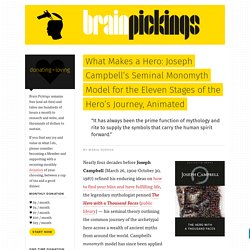
Campbell’s monomyth model has since been applied to everything from the lives of great artists to pop-culture classics like Star Wars. Notes and Queries in Anthropology. Ethnography: A Scientist Discovers the Value of the Social Sciences. Bronislaw Malinowski with natives on Trobriand Islands, ca 1918.
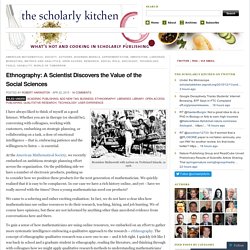
I have always liked to think of myself as a good listener. Whether you are in therapy (or should be), conversing with colleagues, working with customers, embarking on strategic planning, or collaborating on a task, a dose of emotional intelligence – that is, embracing patience and the willingness to listen — is essential. At the American Mathematical Society, we recently embarked on ambitious strategic planning effort across the organization. On the publishing side we have a number of electronic products, pushing us to consider how we position these products for the next generation of mathematician.
We quickly realized that it is easy to be complacent. We came to a sobering and rather exciting realization: In fact, we do not have a clear idea how mathematicians use online resources to do their research, teaching, hiring, and job hunting. What do we mean by ethnographic research? How Different Cultures Around the World Deal With Emotion and Conflict. Negotiating with Filipinos?
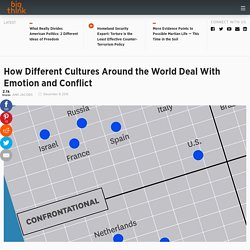
Be warm and personal, but stay polite. Cutting das Deal with Germans? Stay cool as ice, and be tough as nails. So what happens if you're a German doing business in the Philippines? That's not the question this map was designed to answer. Vertically, the map distinguishes between countries where it is highly haram to show emotions during business proceedings (Japan being the prime example) and countries where emotions are an accepted part of il commercio (yes, Italians are emotional extroverts — also in business). The horizontal axis differentiates countries with a very confrontational negotiating style — think heated arguments and slammed doors — from places where decorum is the alpha and omega of commercial dealings. In general, the map says: For cold-as-fish negotiations, go to northern Europe or eastern Asia. This map found here at the Harvard Business Review website. Strange Maps #753 Got a strange map? Ethnography: A Scientist Discovers the Value of the Social Sciences.
Why Eastern And Western Cultures Tackle Learning Differently. Copyright © 2013 NPR.
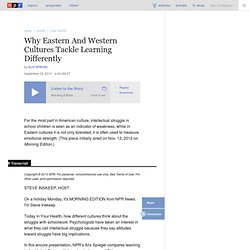
For personal, noncommercial use only. See Terms of Use. For other uses, prior permission required. On a holiday Monday, it's MORNING EDITION from NPR News. I'm Steve Inskeep. Official Definitions of Indigeneity « Indigeneity, Language and Authenticity. B o r d e r l a n d s e-journal. On Worrying: the lost art of the well-administered national cuddle* Ghassan Hage University of Sydney Introduction.
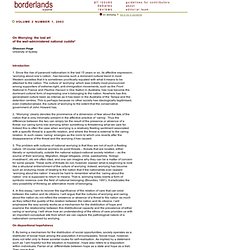
The Mental Life of Plants and Worms, Among Others by Oliver Sacks. The Formation of Vegetable Mould through the Action of Worms: with Observations on Their Habits by Charles Darwin London: John Murray (1881) Jelly-Fish, Star-Fish, and Sea-Urchins: Being a Research on Primitive Nervous Systems by George John Romanes.

The Original Affluent Society. The Original Affluent Society Marshall Sahlins Hunter-gatherers consume less energy per capita per year than any other group of human beings.
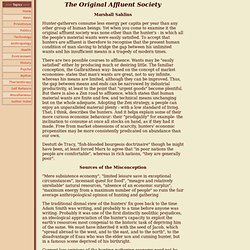
Access denied. Access denied. Sokal's Hoax. The New York Review of Books, Volume XLIII, No. 13, pp 11-15, August 8, 1996 Like many other scientists, I was amused by news of the prank played by the NYU mathematical physicist Alan Sokal.
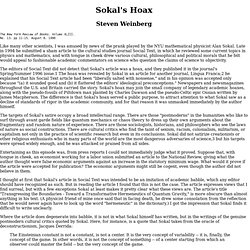
Late in 1994 he submitted a sham article to the cultural studies journal Social Text, in which he reviewed some current topics in physics and mathematics, and with tongue in cheek drew various cultural, philosophical and political morals that he felt would appeal to fashionable academic commentators on science who question the claims of science to objectivity. Heroin Chic: The Fashion Phenomenon Analyzed Through the Writing of Christine Harold and Timothy Hickman.
Heroin chic emerged in the 1990s as a high class fashion trend which appropriated visual imagery of heroin junkies and their environment into fashion photography.
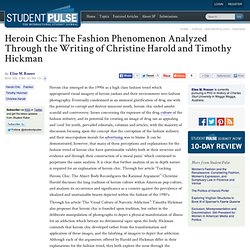
Eventually condemned as an immoral glorification of drug use with the potential to corrupt and destroy innocent youth, heroin chic ended amidst scandal and controversy. Issues concerning the exposure of the drug culture of the fashion industry, and its potential for creating an image of drug use as appealing and ‘cool’ for youth, pervaded editorials, columns and articles, with the majority of discussion focusing upon the concept that the corruption of the fashion industry and their unscrupulous morals for advertising was to blame. Explore – How long different animals live, in vintage... Interviews - Sherry Turkle. There seems to be a mass of cheerleaders out there who are celebrating this digital revolution, particularly in education.

I think that we live in techno-enthusiastic times. We celebrate our technologies because people are frightened by the world we've made. The economy isn't going right; there's global warming.
Lectures.